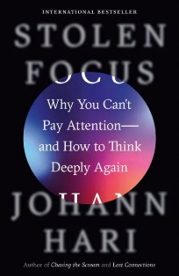 Review By: Myra Salzer
Review By: Myra Salzer
The title almost says it all. I appreciate how Hari sticks to the topic. As you would expect, much attention was given to smartphone distractions. Real science was applied rather than the oft worried “people in the know” who claim it is toxic to our brains. It turns out (though with some exceptions) that is the case, and the statistics Hari quotes support that fully, especially as it applies to young, developing brains.
This book, fortunately, is more than a rant. He comes up with practical solutions, from the obvious – “turning notifications off” – to the more obscure: “going outside and giving your brain a break,” “breathing exercises,” and “avoiding processed foods.” I knew that the prevalence of processed food could somehow be related to obesity, but I hadn’t realized there’s a direct connection to brain function and ability to focus. Hari postulates (with supporting evidence) that the prevalence of ADHD would be reduced significantly if the brains were more nourished and less distracted by noise and visual stimulants.
The book is peppered with quotes that I found insightful. He quoted James Baldwin: “Not everything that is faced can be changed, but nothing can be changed until it’s faced.” This applies to the example above. As a society, it’s wise to recognize the toxic life patterns we’ve evolved to, so that we can return our brains to have an ability to focus better.
One of Hari’s solutions to improving focus is to exercise your brain as you would a muscle. If you haven’t been working out, you wouldn’t be expected to go to the gym and do a full set of 200 lb. deadlifts without working up to it. Similarly, people who have developed a pattern of distraction need to exercise their brain incrementally. Maybe, start with a 10-minute focus and a one-minute break, and work up from there.
Among the topics the book covers are flow states; the effects of physical and mental exhaustion; how to recapture the ability to enjoy sustained reading; breaking habitual mind-wandering; how technology can manipulate and interfere with focus; the detrimental effects processed foods and pollution have on focus; and he wrote quite a bit about the effects on the developing mind of a child, and how their structured lives coupled with the lack of free time to be bored, and then creative, has robbed them of the ability to learn to focus.
You might wonder how this might apply to inheritors of wealth. Well, I see a lot of applications. Heirs can afford to over program their kids with soccer practices, music lessons, drama, camps, and family vacations. They can also afford to slap a smartphone screen or iPad screen in front of a squirmy child to make their lives temporarily easier. The good news is that families of wealth can also afford and often pay attention to the quality of the food they’re eating.
Wealthier individuals often have the luxury of free time, during which they can engage in social media or therapy shopping. When there is no need for financial gain, one can lack purpose – which, of course, will affect their focus.
Refreshingly, possible solutions to these distractions were suggested in the book – so, in fact, it wasn’t merely a book of complaints, but a book of acknowledgments along with practical, implementable solutions. Very refreshing!